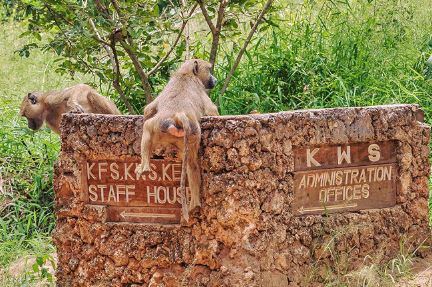Moment baboon narrowly escapes from crocodile's jaws
The gripping scene was captured at Tsavo West National Park.
The mother had left the 25-day old baby girl sleeping in the makeshift Somali house to go fetch water.
In Summary

Audio By Vocalize

Tragedy struck a family when a baboon attacked a makeshift house in a village in Leheley, Wajir County, and killed an infant on Monday.
Police said the infant was 25
days old.
The mother of the minor had left
the baby girl sleeping in the makeshift Somali house and went to fetch water near
the area.
When she came back and found the
baboon running out of the house.
On checking, she found the baby dead
after being mauled.
Police and Kenya Wildlife Service
officials were informed of the incident and visited there as part of the probe.
The remains of the baby were later
removed from the scene and buried as per the culture, police said.
The family was advised to seek
compensation even as the probe into the incident goes on.
Such incidents are common in the area, and locals say the animals fight for water.
They mostly target women amid calls for action to address the trend.
This is the latest incident of human-wildlife conflict amid efforts to solve the growing crisis.
In May 2025, Kenya introduced the third phase of its Human–Wildlife Conflict Compensation Programme, an initiative aimed at addressing these incidents and supporting affected families.
During its launch at Meru National Park, President William Ruto unveiled the innovative Wildlife Conservation Card, a new tool designed to help fund conservation efforts.
“Compensation is justice, but prevention is progress,” Ruto said, emphasising the need for long-term solutions that benefit both people and wildlife.
“Through the Conservation Card, fencing, and community‑led tourism, we are turning conflict into opportunity,” he added.
Developed in partnership with KCB Bank, the Wildlife Conservation Card is available in three tiers—Platinum (Elephant), Gold (Lion), and Silver (Cheetah).
A portion of every transaction made with the card (Sh10, Sh5, and Sh3, respectively) goes directly to the Wildlife Conservation Trust Fund.
The initiative aims to enable Kenyans and international supporters to contribute to wildlife conservation while fostering economic benefits for local communities.
With this new approach, Kenya hopes to build a
future where humans and wildlife can coexist more safely and sustainably.
There has been a slight increase in
cases of human-wildlife conflict in various parts of the country.
The most common ones involve elephants. Other wild animals like leopards attack domestic animals living in the common national parks in the trend amid efforts to address the menace, officials say.
The gripping scene was captured at Tsavo West National Park.